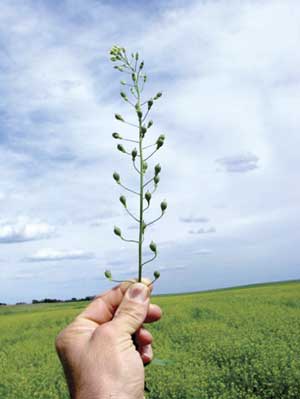July 2008
 View Full Print Edition
View Full Print EditionBusiness Briefs
Columns

Risk Factors: Protect the Company and the Investor
By Sara Thompson
Canola Biodiesel: Good for the Heart, Engine
By Angela Dansby
Featured

Is There Room For Camelina?
By Khalila Sawyer
With a short growing season and low harvesting costs, Camelina sativa could hold a small market in the western Canadian biofuels industry. Despite those advantages, limited research has been done to determine its full agronomic potential. While it's been touted as a potential feedstock for biodiesel, it remains an under-exploited crop, and with an industry entrenched in canola-based biodiesel, is there enough room to consider camelina?

Do Oil and Biodiesel Mix?
By Kris Bevill
Nova Biosource Fuels Inc. is headquartered in Houston-the heart of America's oil industry. The biodiesel company has several former oil executives and industry professionals on its payroll who think there's room enough in Texas for both fuels.
Rising in the East
By Khalila Sawyer
With a number of new developments in the biofuels sector, eastern Canada is making waves with new funding, projects, opportunities and hope. But, with a lack of provincial government support and biofuel initiatives, the renewable fuels industry in the Maritimes is struggling to catch up to the rest of the country. Nevertheless, eastern Canada continues working to establish its presence in the biofuel industry with a variety of resources and opportunities.

The Nature of Standards
By Jerry W. Kram
A significant effort has been made by the biodiesel industry to create quality standards and encourage producers to adhere to those standards. But why are standards necessary in the first place? What do they contribute to the industry that makes all the time, effort and negotiations worthwhile?

Palm Oil Fights Back
By Susanne Retka Schill
Malaysian oil palm growers try to turn the tide of public criticism with a conference devoted to discussing the tropical oil crop's sustainability and carbon footprint.

Micromanaging Fuel Use
By Ron Kotrba
Rising fuel prices and the need to conserve resources and protect the environment make excellent motivators for fleet operators to reconsider how they refuel.











